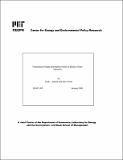| dc.contributor.author | Joskow, Paul L. | en_US |
| dc.contributor.other | Massachusetts Institute of Technology. Center for Energy and Environmental Policy Research. | en_US |
| dc.date.accessioned | 2009-04-03T17:04:22Z | |
| dc.date.available | 2009-04-03T17:04:22Z | |
| dc.date.issued | 2000 | en_US |
| dc.identifier | 2000-002 | en_US |
| dc.identifier.uri | http://hdl.handle.net/1721.1/44966 | |
| dc.description.abstract | We analyze whether and how the allocation of transmission rights associated with the use of electric power networks affects the behavior of electricity generators and electricity consumers with market power. We consider two alternative types of transmission rights: (1) financial rights which give the owner a share of the congestion charges which accrue to the network operator when the network is congested and (2) physical rights which give the owner the right to utilize scarce transmission capacity without paying additional congestion charges. The analysis first focuses on a two-node network where there are cheap generation supplies available in an exporting region, expensive generation supplies controlled by a single firm in an importing region, and a congested transmission link between the two regions. We find that holding financial rights enhances the market power of a monopoly generator in the importing region. The ultimate allocation of rights depends on the microstructure of the rights market through the ability of initial rights holders to free ride on generators with market power enhancing the value of the transmission rights. We next examine whether and how reliance on physical rather than financial rights affects these results. We find that holding physical rights can both enhance the market power of a generator in the importing region and lead it inefficiently to restrict imports of cheap power from the exporting region by "withholding" some physical rights from the rights market. | en_US |
| dc.description.abstract | Inefficient withholding of physical rights leads us to consider "capacity release" rules which mitigate withholding. These results are summarized with a comparison of the welfare properties of financial and physical rights with and without capacity release rules. The paper concludes with discussions of extensions to alternative buyer and seller market power configurations and to a three-node network to incorporate loop flow considerations. The extension to the three-node network does not change the basic conceptual results, but does reveal complications with the use of physical rights in the presence of loop flow. | en_US |
| dc.description.sponsorship | Supported by the MIT Center for Energy and Environmental Policy Research. | en_US |
| dc.format.extent | 58 p | en_US |
| dc.publisher | MIT Center for Energy and Environmental Policy Research | en_US |
| dc.relation.ispartofseries | MIT-CEEPR (Series) ; 00-002WP. | en_US |
| dc.title | Transmission rights and market power on electric power networks | en_US |
| dc.type | Working Paper | en_US |
| dc.identifier.oclc | 44157621 | en_US |
